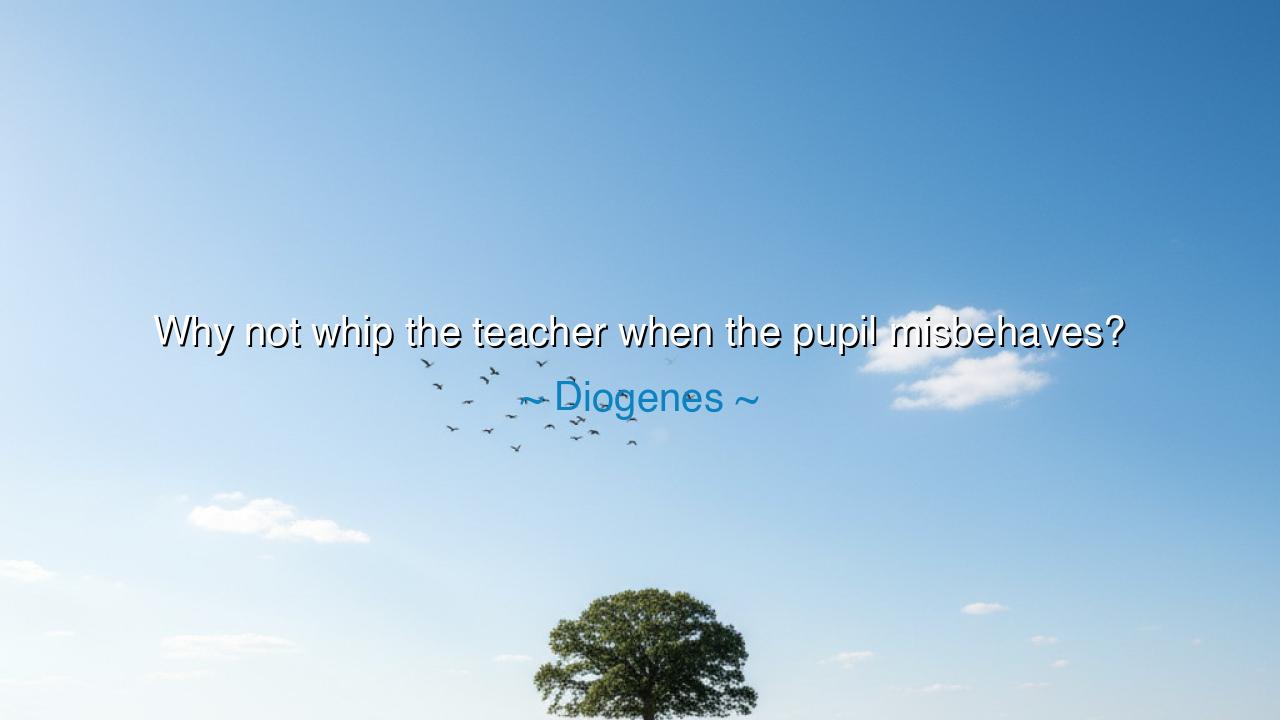
Why not whip the teacher when the pupil misbehaves?






Diogenes of Sinope, the ragged sage of the Cynics, once hurled this cutting question into the world: “Why not whip the teacher when the pupil misbehaves?” With the sting of irony, he reminded men that responsibility is not borne by the student alone. If the one entrusted with guidance fails in his charge, why should the blame rest solely upon the child? His words, sharp as a lash themselves, pierce into the heart of education, leadership, and accountability.
The origin of this quote lies in Diogenes’ lifelong mission: to expose hypocrisy, to strip away the pretense of society, to force men to confront truths they wished to avoid. In Athens, where teachers boasted of their wisdom and sold it for coin, Diogenes challenged the very notion of their authority. He would not allow the teacher to cloak himself in dignity while excusing the failures of those under his care. To him, if the pupil strays, it is a sign not only of the child’s folly, but of the teacher’s negligence.
History provides examples of this principle. Consider the Roman tutor Seneca, who sought to instill wisdom in his imperial pupil Nero. The failure was monumental: Nero became a tyrant, remembered for cruelty, indulgence, and fire. And yet, some have asked: was Nero’s descent entirely his own fault, or did Seneca bear guilt for failing to restrain and shape him? Here, Diogenes’ lash falls heavy: if the student becomes a monster, the master too must stand accused.
But the saying need not be confined to classrooms. In armies, if the soldier falters, is not the commander to blame for poor training? In households, if the child grows wild, does not some share of guilt fall upon the parent? In governments, if citizens fall into corruption, can leaders claim innocence? Diogenes’ biting remark reminds us that authority is never free of burden. To guide others is to accept responsibility for their errors as well as their successes.
Yet his words are not only accusatory; they are a call to vigilance. The teacher must not take lightly the sacred trust of shaping another’s mind. Every failure of the pupil must be a mirror, showing where the guide might have been more patient, more firm, more wise. Thus, the lash is metaphorical as well as literal: a demand that teachers discipline themselves as rigorously as they do their students, lest they fall into hypocrisy.
The lesson for us is clear: when others stumble under our guidance, we must not rush to condemn them alone. First, we must ask: did we prepare them well? Did we embody the lessons we sought to teach? Did we nurture as well as instruct? To lead, to parent, to teach — these are not roles of privilege but of weight, for in the failures of those we guide, our own failures are reflected.
What must you do, then? If you are a teacher, accept that your students’ errors are not merely theirs but partly yours. If you are a leader, recognize that your people’s weakness calls you to stronger example. If you are a parent, remember that the child imitates your deeds as much as your words. And if you are a pupil, remember too that while your choices are your own, they are shaped by those who guide you. Thus, mutual responsibility binds teacher and student, leader and follower, parent and child.
So let Diogenes’ scornful cry echo through the ages: “Why not whip the teacher when the pupil misbehaves?” It is a challenge to all who claim authority, to remember that power is never without accountability. To guide another life is to hold a portion of its destiny in your hands. Fail in this duty, and the lash of truth will find you, as it found those pompous teachers in the streets of Athens when Diogenes raised his voice against them.






AAdministratorAdministrator
Welcome, honored guests. Please leave a comment, we will respond soon